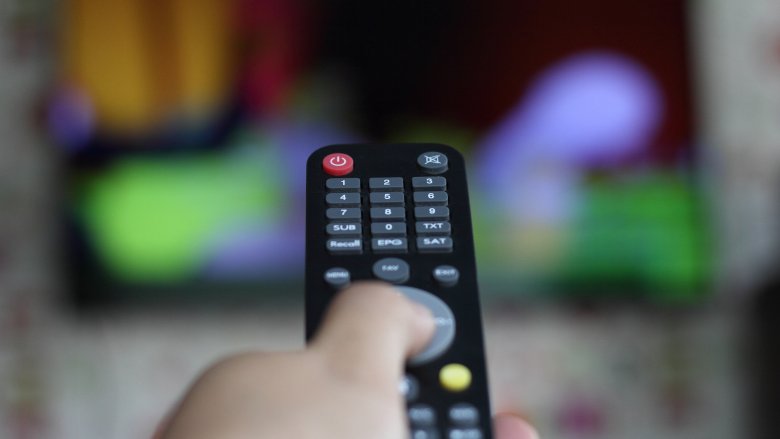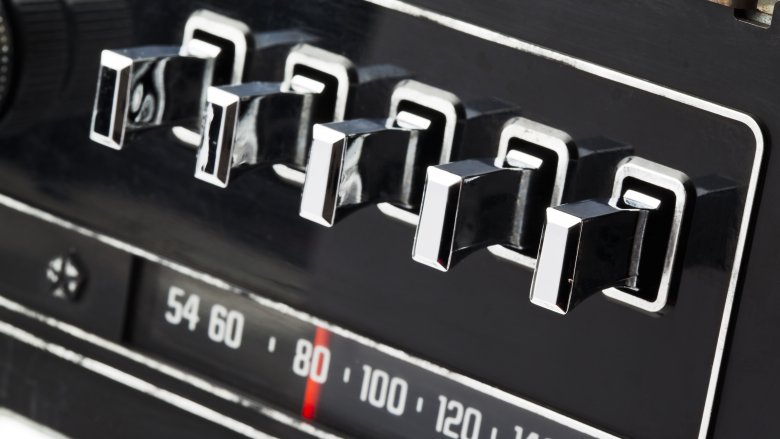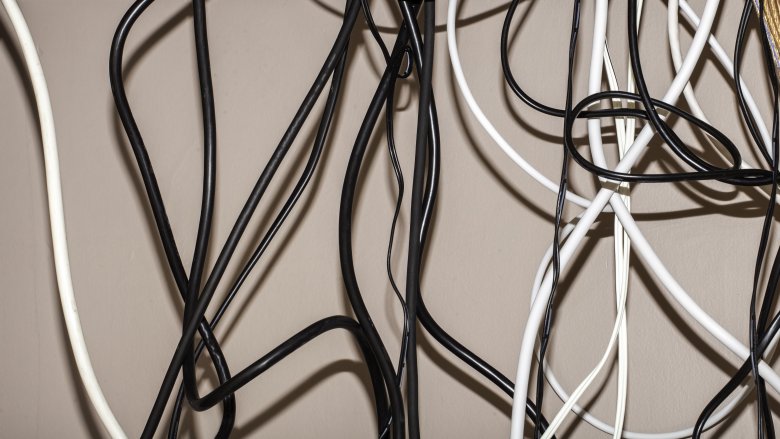Technology That Probably Won't Exist In 20 Years
It wasn't really that long ago that no one had ever heard of a microwave or a home computer, and movies could be watched at a movie theater, or on one of three network television stations (but only once a year and with one 10-minute commercial break for every five minutes of entertainment), or on a big, blocky VHS tape that had to be rewound before you could use it and that wore out to the point of unwatchability after about a half dozen viewings. Also, no one had a smartphone and everyone lived in caves and wrote their shopping lists down on stone tablets and wore shoes made out of deerskin and cork and entertained themselves through conversation and reading. Terrible, terrible times.
Today we have technology to entertain us and make it so we don't ever have to answer the question, "How was your day?" But technology changes fast, and some of the objects we've come to depend on will be obsolete not in 50 or 100 years but in a couple of short decades. The good news is that most of these once-wonderful technological devices won't really be missed, with maybe one or two exceptions, depending on how much of a Luddite you actually are. But you'll probably want to decide that for yourself.
(Disclaimer: Predicting the future is hard and is mostly educated guessing. If you disagree with these ideas, feel free to contact us in 20 years to brag.)
The remote control that you keep losing
Everyone knows the greatest human achievement of all time was the self-finding remote control. Once, we were all doomed to search in vain for that elusive television-controlling device, only to find it two weeks later in the most stupid location in the house, like on top of the refrigerator or at the bottom of the fish tank. In the meantime, we've had to endure night after night of actually watching commercials and being forced to walk three paces between the armchair and the TV set whenever we want to change the channel. Yes, that auditory homing feature is the Best Thing Ever — at least for another decade or two, since USA Today thinks remote controls will soon disappear forever, just like rotary phones and CRT TVs.
So what sort of tech will move in to replace the much-maligned remote control? Humans will. Or more specifically, our voices. Instead of punching in the numbers and commands on your remote control, you'll just tell the TV what to do verbally. So it will be a lot like those voice-activated menu systems you get dumped into when you call the bank, only instead of screaming "REPRESENTATIVE!" over and over, you can scream "THE LATE SHOW, YOU STUPID MACHINE!" while your whole family stares at you in dismay. Delightful.
Boring prosthetics
A few hundred years ago, losing a limb meant getting a peg or a hook, which was not super comfortable or efficient but was at least kind of cool, especially if you were a pirate. As medical science progressed, prosthetics did, too, and today they're a lot more functional and comfortable than they were in the days of swashbuckling and walking the plank. But the prosthetics of the future might be more than just functional — some companies are already designing prosthetics that are part medical device, part work of art.
According to Business Insider, many modern artificial limbs can do more than just pick up objects or help someone walk again, because who needs normal function when you can have superpowers? James Young has a bionic arm that features a landing pad for his racing drone and a phone charger. Mostly, it just looks super-cool. It has adjustable lighting that he can change according to his mood, and it's styled after the bionic arm used by Snake in Metal Gear Solid.
Some modern prosthetics are even more specific — a French artist named JC Sheitan Tenet has an arm that functions as a tattoo gun. And as technology advances, it's likely that no one will have to suffer with a boring, purely functional prosthetic device anymore — they'll all be customized to not only look cool but also to provide specific, individualized functions to each user.
Your brain as a four-digit storage device
If you have one debit card it probably isn't a huge deal to remember your PIN number. But multiple cards, account entry points, PINs you have to change because someone else might know your PIN, PINs you didn't even know you had — that's the usual state of affairs for most Americans under the age of 97.
The PIN was supposed to make data more secure, but that's only true if your brain can store all those numbers and you don't just write them down and put them in your wallet, which is why a lot of people just use the same PIN for every account.
According to American Banker, PIN-based data security is already on its way out — it's just too easy for hackers to steal PIN numbers, which often means a consumer's entire account (and any other account he or she uses that same PIN number for) could be compromised. On the other hand, the modern chip-based credit card assigns a unique, one-time code to each transaction, which means hackers can't grab that data and use it to counterfeit a card or make fraudulent purchases.
Once the PIN goes, let's hope the password follows, especially that ridiculously cryptic password that your local grocery store wants you to have, you know, so no one will log on to your account and steal your toilet paper coupons.
Music and news being free anytime, anywhere
Once only a few decades ago, FM radio was an American staple. All cars came with an FM radio, and not only that but people would actually use their FM radio to access free on-the-go information and entertainment. Today's vehicles can get music and news via satellite — for a small fee, of course — or you can wirelessly connect your phone to your car's speaker system and then scream in frustration as it inexplicably keeps dropping the connection or goes completely silent as your road trip leads you into those data-free wastelands that exist outside between pretty much every American metropolitan area and every other American metropolitan area.
According to the San Diego Reader, as the years progress more and more new cars will ship without AM/FM radios as standard equipment. This despite all the frustrations of accessing digital entertainment in your car, but who are they to stand in the way of progress?
Eventually, though, cell towers will spread across the land like a fungus. One day there won't be data-free wastelands anymore, so no need to tune into the local FM station, which is mostly just two or three songs at a time wedged in between 40 minutes of commercials anyway, so no huge loss.
(Gulp) The smartphone
If you just cannot imagine living without a flat, vaguely rectangular object practically glued to the palm of your hand for at least 16 hours a day, you might just want to skip past this horror-filled entry and spend a few minutes breathing into a paper bag. Yes, one day your smartphone will go the way of the flip phone, and be forever no more. Your thumbs will become weaker, and your neck will reshape into a curiously straight and forward-looking orientation.
Don't panic, though. No one expects us to give up all the reading, social networking, and sharing of stupid memes that are the reasons why we've come to depend so completely on our smartphones, so it's not like you're going to be expected to go back to the days of talking to other humans with your mouth and/or making eye contact. All the social networking and meme-viewing will still be possible, but Business Insider says they'll be accomplished via a pair of goggles that just beams information directly into your eyeballs.
Remember all that noise about how smartphone radiation might be making us susceptible to brain cancer? Well, we all breathed a sigh of relief when scientists declared that it wasn't anything to worry about (and then we also ignored the 190 independent scientists who said it was), and now we're looking forward to a time when radiation basically gets injected into your brain via your eyeballs. Technology is grand.
That guy with the black smoke-belching monster truck
One technology we won't miss are PowerPoint presentations because they obviously suck, as do those trucks that spew pollution into the air because it sounds and looks cool and also because oxygen is for suckers. In fact all gasoline-powered engines will one day become obsolete, and it might happen sooner than you think.
According to Clean Technica, the only thing standing between us and a green world is the cost of the technologies that can convert and distribute clean energy. As that technology becomes cheaper, renewable energies will become more desirable, and not just because they're better for the environment. Fossil fuels are finite, so the current fossil fuel-based energy economy operates on supply and demand. But the sun and wind are infinite, which means harnessing them is just a matter of paying for the technologies, not for the fuel itself.
If you feel kind of skeptical that this might happen in 20 years, it's already happening — in 2014 in Australia, for example, there were 1.4 million solar-powered buildings (which accounted for 11 percent of the entire nation). And the driving force behind the change is not the knowledge that solar energy is cleaner, it's the knowledge that solar energy is cheaper. Human beings may have mostly good intentions, but when it comes to those big choices the wallet is the great equalizer, which means the human tendency to be cheap may ultimately save the world ... from the human tendency to be cheap.
Cancer medicine that's barely better than death
Of all the sucky things that can happen to a person over the course of a lifetime, a cancer diagnosis is definitely one of the suckiest. Not only is it terrifying and debilitating, but the treatment itself is especially horrible, and sometimes even leads sufferers into thinking it might be better to let the disease run its course than to submit to treatments that sap all the joy from the few remaining years of one's life.
So now that you've read the most depressing two sentences you're likely to encounter today, you can either just try to pretend like cancer will never happen to you and stay the heck off WebMD (where every symptom leads to a cancer diagnosis), or you can look forward to a future where chemotherapy is no longer the standard treatment for cancer. Make no mistake, getting cancer will still suck, but at least it won't mean months of vomiting and hair loss.
According to Business Insider, 20 years from now chemotherapy will be totally obsolete — the standard treatment will instead be targeted therapies that are based on our understanding of human genetics. Genome sequencing will be used to pinpoint the cause of someone's cancer, and to tell doctors how to treat it. The result will be better survival rates for cancer patients as well as treatment that does not make patients have to choose between death or barely-tolerable life. That definitely sounds like a win-win.
The encryption technology that no one really understands anyway
Quantum computing sounds like something out of Star Trek, or worse, something you wrote in your high school science fiction class around the same time as you wrote that story about a comet that turns all Earthlings into cyborgs. Most of us can get our minds around the fact that computers do everything with zeros and ones, but it's a lot harder to imagine a computer that does everything with numbers that are both zero and one simultaneously. So instead of trying to explain how that works, because there are only a few people in the whole world who actually understand it and maybe another dozen who pretend like they do, we'll just say that one day quantum computers will replace modern computers.
This isn't even still in the realm of science fiction. According to Data Center Knowledge, IBM already has a quantum computer and says quantum computers that are more powerful than modern computers aren't far off. When that technology arrives, those new computers will be powerful enough to beat the encryption algorithms that are currently keeping our data safe. So before quantum computers become more than just a thing IBM is bragging about, companies (and entire nations) will need to completely rethink the way they encrypt data.
That sinister bundle of tangled wires that you can't make sense out of
There aren't too many old technologies that we'll really spend much time grieving over. The one that we'll be least sad to see go (besides chemotherapy) is the wire, which is not only a symbol of our technological servitude but also a significant trip hazard in the middle of the night and a huge cause of frustration when you need to unplug just one stupid device and you have no idea which one of those five million cords is the right one.
One day, wires will no longer be a thing. According to PC Magazine, Ikea, which specializes in crappy furniture that looks great until a slight breeze causes it to crumble into a fine dust, rolled out a line of furniture that double as device chargers in 2015, and you can still buy an Ikea wireless charger to add to your other Ikea furniture. That means when you need to charge your phone (or your radiation-beaming pair of goggles) you can just put it down on your end table and it will charge without you ever having to hunt down the cable your teenager pilfered because his goggles need charging way more than yours do.
It's not just your personal devices that will become wireless — your electric car will charge wirelessly, and all your kitchen appliances will be cordless, too. That will not only be better for the aesthetics of your home, but also for your sanity.
Your pile of scratched and mostly unwatchable DVDs
That stack of DVDs that are mostly unplayable anyway because your kids/spouse/roommate can't be bothered to just put them back in the DVD case instead of tossing them on an end table? Those expensive silver disks will become obsolete sooner than you think. In fact for many people they are already obsolete.
Once we live in a totally wireless world, the DVD and even its high-tech descendant the Blu-ray will follow the smartphone and the remote control into technological obscurity.
According to Techetron.com, sales of music CDs have already plummeted to the point where a lot of big music retailers have gone the way of Blockbuster, which went the way of Radio Shack, which went the way of Polaroid. Consumers will prefer media that can't be scratched or lost, which means purely digital copies, downloaded from services like Amazon or Netflix. So what will you do with the thousands of dollars' worth of DVDs and Blu-rays you've accumulated over the years? The good news is Pinterest has some great ideas for upcycling them into mosaic tables, pen caddies, and snowman ornaments, and it doesn't even matter that they were hopelessly scratched by your kids/spouse/roommate. The possibilities are endless.










